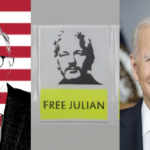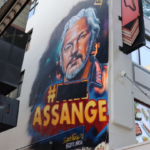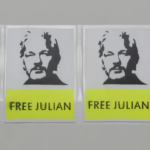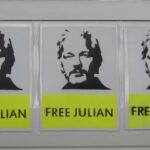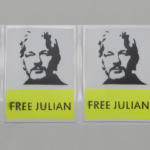Crunch Time for Assange, Global Press Freedom and the Rule of Law
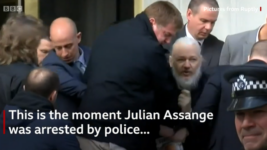
A final press briefing in regard to the extradition trial of Australian publisher and journalist Julian Assange was held at the Foreign Press Association in London on Wednesday, ahead of Monday’s determination of the British High Court, which will seal the fate of the WikiLeaks founder.
Two High Court justices presided over two days of extradition hearings in February, with three grounds of appeal put by Assange’s lawyers granted leave, with the US then provided the ability to submit assurances to address these, which it did via a diplomatic note dated 16 April.
What will happen on Monday, explained Julian’s wife Stella Assange on 15 May, can’t be anticipated. And while the lawyer doesn’t consider the US diplomatic note provides the assurances sought and should be rejected, she believes her husband should have succeeded on prior points long ago.
Stella hasn’t given up hope, however. And she said the bipartisan support the Australian government gave to an Andrew Wilkie-brought motion calling for the case to be dropped in mid-February, which saw two-thirds of the lower house vote in favour, has been crucial in shifting potential outcomes.
But as WikiLeaks editor-in-chief Kristinn Hrafnsson put it, as he sat beside Stella, the extradition case over the last five years has transpired in such a manner that it’s “abundantly clear” that there’s “institutional corruption on a judicial level” in the UK, and the trial “has been rigged against Julian”.
Free speech protections likely denied
“What the US is doing with this case is they are setting a precedent where they are exercising jurisdiction over any journalist or publisher anywhere in the world, who receives, possesses and publishes US information,” said Julian’s lawyer Jennifer Robinson.
The White House reached across the Atlanta to arrest Assange by proxy in the UK on 11 April 2019, and following a brief sentence he served due to breach of bail, the journalist has spent the last five years on remand in London’s notorious Belmarsh prison in conditions of prolonged isolation.
Assange is facing 18 charges contained in the superseding indictment of 24 June 2020, which carry a combined maximum of 175 years, and the document ensures that Assange will be tried in East Virginia, home to US defence and spying agencies, meaning the jury will be sourced from this pool.
The court accepted three of the nine grounds of appeal put in February, which comprise of requiring Assange’s right to free speech to be protected under the First Amendment, that this won’t be denied due to nationality, and that he won’t be charged once in the US with an offence carrying death.
And diplomatic note number 601 was provided by the US embassy in London in April, which outlines that “Assange will have the ability to raise and seek to rely upon” the First Amendment, and “that the death sentence will neither be sought nor imposed on Assange”.
But Robinson counters that the note provides no assurance of First Amendment protections, as there’s a long series of case law that sees foreign nationals who’ve committed acts outside the US denied the protection. So, she makes certain, the court shouldn’t rely upon this as an assurance.
Extradition alleviates need to kidnap
“In fact, every day, since the 7 December 2010,” Stella told the press this week, her husband “has been in one form of detention or another”, as this was the date when Scotland Yard first arrested him, and she added it was “seven days after WikiLeaks started publishing the diplomatic cables”.
Assange published five major US intelligence leaks, comprising around 70,000 classified files over 2010 and 2011. However, it’s widely understood now that the Trump administration likely decided to pursue the case in 2017, after Julian published the details of the CIA hacking manual Vault 7.
“The processes in the courts in the United Kingdom are corrupt,” Hrafnsson outlined. And he added that this is clear from “all the opportunities” the US has been given to “amend their case when it was about to collapse”. Indeed, the US has been given two opportunities to provide assurances.
The WikiLeaks editor further pointed to paragraph 210 of the court judgement relating to the February court appeal, as it outlines that Assange couldn’t appeal extradition on the newly presented evidence that the Trump administration had considered kidnapping or assassinating him.
And the court found that the rationale behind suggestions that Assange shouldn’t be handed over to a nation that once sought to commit these crimes against him, as, once extradited, he’ll be in US custody, and the reasons to kidnap or assassinate him in the manner plotted will be redundant.
“Can you believe this?” asked Hrafnsson. “This is not something you read out of papers in the Royal Courts of Justice. It is unbelievable. So, the judicial process is rigged.”
Global implications
Stella explained that there are three potential outcomes on Monday. The court could approve extradition, at which point in the past, she added, “other national security cases of extradition” to the US have seen the defendant “extradited within 24 hours of a decision”.
The second outcome could see the court rule in Julian’s favour, which would mean another full extradition hearing in the UK, or the High Court might decide to have a full hearing on Monday, which could result in her husband being released. Although, this third option is quite rare.
The lawyer also stressed that if the court finds in favour of the US, then an application will be lodged with the European Court of Human Rights to stop that extradition through an order. However, Robinson stressed that this avenue is in no way guaranteed.
Reporters Without Borders director Rebecca Vincent further told the press during the Wednesday briefing that her organisation is behind Assange because global press freedoms are under threat, as the WikiLeaks founder is facing these charges in relation to “normal journalist practices”.
“The publication of the documents was in the public interest: it informed public interest reporting around the world,” the US human rights campaigner further explained. “We still see stories being published on the basis of these releases.”
And if Assange is prosecuted under the US Espionage Act, Vincent underscored, “the precedent is then set for this sort of case to be applied to any publisher, any journalist, any source or any media organisation that works with leaked classified information.”


